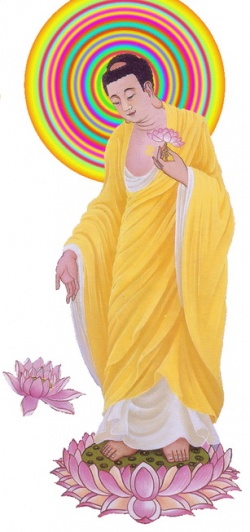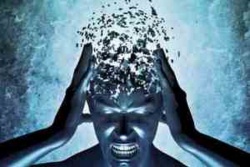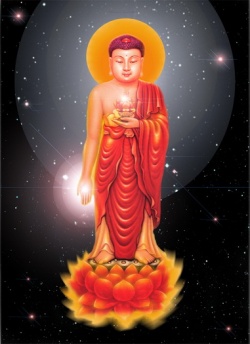Absolute
The Absolute is the concept of an unconditional reality which transcends limited, conditional, everyday existence. It is sometimes used as an alternate term for "God" or "the Divine" especially, but by no means exclusively, by those who feel that the term "God" lends itself too easily to anthropomorphic presumptions. The concept of The Absolute may or may not (depending on one's specific doctrine) possess discrete will, intelligence, awareness, or a personal nature. It is sometimes conceived of as the source through which all being emanates. It contrasts with finite things, considered individually, and known collectively as the relative. This is reflected in its Latin origin absolūtus which means "loosened from" or "unattached."
Similarities and differences in various traditions
Examples of religions and philosophies which embrace the concept of the Absolute in one form or another include Hermeticism, Hinduism, Jainism, Taoism, Islam, some forms of Jewish philosophy, and existential or metaphysical forms of Christianity. Terms which serve to identify The Absolute among such beliefs include Wu Chi, Brahman, Adibuddha, Allah, Para Brahman, Tetragrammaton, God, the Divine, and numerous other appellations. In East Asia, the concept of the Tao, and in South Asia, the concept of Nirvana is synonymous in description to the attributes of the Absolute as used in the West.
The human vital essence - soul, spirit, spark of awareness, is said to have originally derived in each case from the Absolute and to be indestructible after the nature of the Absolute, and to be capable of returning to its source. This returning is the goal of those Eastern religions that have such a concept.
The general commonalities between the various versions of the Absolute are: infinity, indescribability, formlessness, transcendence and immanence. An additional commonality is that one must renounce and/or transcend physical existence and its distractions, in some cases even to the point of extinguishing identity and individual awareness, in order to understand or co-exist with the Absolute. Uniformly, human passions and vices are regarded as barriers to spiritual advancement, and such virtues as humility, charity and righteousness or pacifism are felt to help pave the way to enlightenment.
Thing in itself
Roughly, the Absolute may be distinguished from the following concepts, although there is debate of the synonymity between them:
Thing-in-itself, an actual object and its properties independent of any observer.
The noumenon is a posited object or event that is known (if at all) without the use of the senses.
However, rather than distinguishing from the relative, the thing in itself is used to distinguish an actual object from phenomenon (the appearance of things-in-themselves to the senses).
The Absolute in philosophy
Heraclitus concerned himself with the knowable portion of the Absolute with his Logos. Plotinus, a Neo-Platonic philosopher, saw all forms of existence as emanating from 'The One'. The One of Plotinus is a trans-sentient power or force. The concept of the Absolute was re-introduced into philosophy by Hegel, Schelling, and their followers; it is associated with various forms of philosophical idealism. The Absolute, either under that name, or as the "Ground of Being", or some similar concept, also figures in several of the attempted proofs of the existence of God, particularly the ontological argument and the cosmological argument. In scholastic philosophy the Absolute was regarded as Pure Act, unadulterated with remaining potential.
The concept was adopted into neo-Hegelian British idealism (though without Hegel's complex logical and dialectical apparatus), where it received an almost mystical exposition at the hands of F.H. Bradley. Bradley (followed by others including Timothy L.S. Sprigge) conceived the Absolute as a single all-encompassing experience, rather along the lines of Shankara and Advaita Vedanta. Likewise, Josiah Royce in the United States conceived the Absolute as a unitary Knower Whose experience constitutes what we know as the "external" world.
The mathematician Georg Cantor equated the mathematical concept of the Absolute Infinite with God.
However, the concept need not be taken to imply a universal unitary consciousness. American philosopher Brand Blanshard, for example, conceived the Absolute as a single overarching intelligible system but declined to characterize it in terms of consciousness or experience.
In eastern philosophy the Absolute is known as Parabrahman and to occult philosophy is known as the Void or Ever-Darkness. According to I. K. Taimni both the Vedas and the Upanishads contain indirect hints to an Ultimate Reality an unknowable principle. Taimni describes the Parabrahman as unknowable by the human mind and unthinkable but the highest object of realization and the most profound object of philosophical enquiry. Taimni wrote that:
Because the Ultimate Reality which is denoted by the word 'Absolute' or 'Parabrahman' is the very core of our being as well as the cause and basis of the universe of which we are part, we can no more get away from it than our solar system can get away from the sun round which it resolves and from which it receives everything which keeps it alive and moving. Although the Absolute is sometimes referred to by such epithets as the Void, Ever-Darkness etc. and is beyond intellectual comprehension, still, from the intellectual point of view it is the most profound concept in the whole realm of philosophy. The fact that it is called 'Unknowable' does not mean that it is beyond the range of philosophical or religious thought and something on which thinking is impossible or undesirable. The very fact that it is the heart and the basis of the universe should make it the most intriguing object of enquiry within the realms of the intellect.
— I.K. Taimni, 'Man, God and the Universe', Chapter 1
Criticism
From a Buddhist perspective, there is no text in which the Buddha explicitly argues that the universe lacks an essence; he instead critiques positions regarding an ultimate nature of reality — such as those found in the Upanishads — in the manner of later Prasangikas. The Buddha of the early texts does speak of experiencing "luminous consciousness" beyond the six sense media. Passages in which the Buddha criticizes those who talk about things not amenable to experience are quite common in the early texts.
Nagarjuna, one of the most prominent philosophers of Mahayana Buddhism, was considered by early scholarship as propounding an absolutist doctrine with his development of the Buddhist concept of shunyata. This is criticized by many modern scholars as incorrect and not grounded on textual evidence. The consesnsus is that Nagarjuna defended the classical Buddhist emphasis on phenomena. For him shunyata is explicitly used as a middle way between eternalism and nihilism, and that is where its soteriological power lies. It does not refer specifically to an ultimate, universal, or absolute nature of reality. Holding up emptiness as an absolute or ultimate truth without reference to that which is empty is the last thing either the Buddha or Nagarjuna would advocate. Nagarjuna criticized those who conceptualized shunyata: "The Victorious Ones have announced that emptiness is the relinquishing of all views. Those who are possessed of the view of emptiness are said to be incorrigible." By contrast, many schools of Mahayana Buddhism, particularly those in alignment with the Tathagatagarbha scriptures, affirmed some notions regarding a positive absolute, identifying it with the true or original substance or Self of the Buddha.
Quotations
Kant questioned whether the absolute can be thought.
People have always spoken of the absolutely necessary [absolutnotwendigen] being, and have taken pains, not so much to understand whether and how a thing of this kind can even be thought, but rather to prove its existence.... if by means of the word unconditioned I dismiss all the conditions that the understanding always requires in order to regard something as necessary, this does not come close to enabling me to understand whether I then still think something through a concept of an unconditionally necessary being, or perhaps think nothing at all through it.
— Critique of Pure Reason, A593
Nietzsche criticized Hegel's claims about the non-relative Absolute.
Words are but symbols for the relations of things to one another and to us; nowhere do they touch upon absolute truth. ... Thus it is, today, after Kant, an audacious ignorance if here and there, especially among badly informed theologians who like to play philosopher, the task of philosophy is represented as being quite certainly "comprehending the Absolute with the consciousness," somewhat completely in the form "the Absolute is already present, how could it be sought somewhere else?" as Hegel has expressed it.
— Philosophy in the Tragic Age of the Greeks, § 11.



